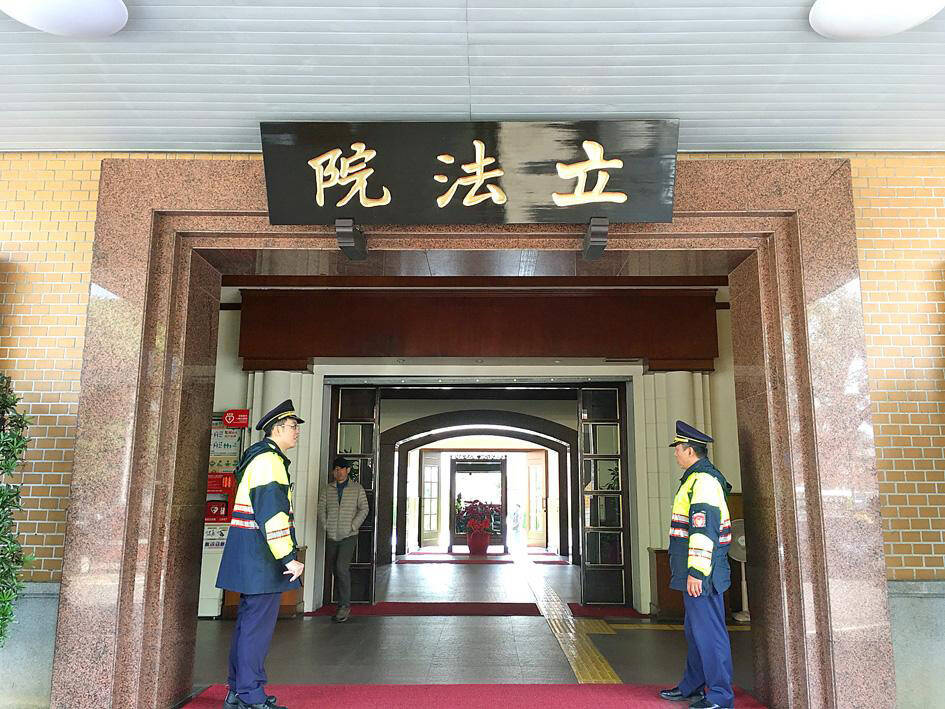Democratic Progressive Party (DPP) legislators have proposed an amendment to strip benefits from military retirees who have received suspended sentences for espionage-related offenses.
China frequently uses retired military officers to “build bridges” with active-duty military personnel in Taiwan, but under the law only those who have received sentences for contraventions stipulated in the Anti-infiltration Act (反滲透法) or the National Security Act (國家安全法) would lose their retirement benefits, DPP Legislator Puma Shen (沈伯洋) said.
The 14 retirees who have been sentenced for espionage-related offenses under those laws have been ordered to repay about NT$40 million (US$1.23 million) worth of benefits, but 85 percent of that remains outstanding, DPP Legislator Michelle Lin (林楚茵) said, adding that the convicted retirees could also avoid paying by applying for administrative relief.

Photo: Lin Liang-sheng, Taipei Times
Shen and Lin, along with DPP legislators Wu Li-hua (伍麗華), Lin Yi-chin (林宜瑾) and Tsai Yi-yu (蔡易餘), last week submitted a draft amendment for the Act of Military Service for Officers and Non-commissioned Officers of the Armed Forces (陸海空軍軍官士官服役條例) to the legislature’s Foreign Affairs and National Defense Committee.
The service regulations for officers and non-commissioned officers of the army, navy and air force stipulate that those who commit acts that facilitate civil strife or foreign invasion, or that endanger national security through the sharing of national secrets with a foreign power and are sentenced to fixed-term imprisonment, must lose their retirement benefits.
The proposed amendment adds that in cases where the prosecutor does not pursue a case or defers prosecution, or where a sentence has not yet been determined, the retiree would also lose their benefits.
Separately, Chinese Nationalist Party (KMT) lawmakers last week submitted proposed amendments to national defense-related laws to the committee for review.
KMT Legislator Hsu Chiao-hsin (徐巧芯) proposed amending Article 5 of the Pay Act of the Armed Forces (軍人待遇條例) to add a “combat bonus” for officers and soldiers serving in combat and combat support units to increase recruitment incentives.
Hsu also proposed amending the Armed Forces Punishment Act (陸海空軍懲罰法) to remove forms of corporal punishment, which she said had no educational benefit for soldiers and would deter recruitment.
KMT Legislator-at-large Weng Hsiao-ling (翁曉玲) proposed an amendment to Article 34 of the Military Trial Act (軍事審判法) to stipulate that cases of military personnel involving the Criminal Code be handled by military trial.
The law was amended following former army corporal Hung Chung-chiu’s (洪仲丘) death in 2013 to have cases handled by the civilian criminal court system, which led to criticism that it would harm military interests and national security.

CHAOS: Iranians took to the streets playing celebratory music after reports of Khamenei’s death on Saturday, while mourners also gathered in Tehran yesterday Iranian Supreme Leader Ayatollah Ali Khamenei was killed in a major attack on Iran launched by Israel and the US, throwing the future of the Islamic republic into doubt and raising the risk of regional instability. Iranian state television and the state-run IRNA news agency announced the 86-year-old’s death early yesterday. US President Donald Trump said it gave Iranians their “greatest chance” to “take back” their country. The announcements came after a joint US and Israeli aerial bombardment that targeted Iranian military and governmental sites. Trump said the “heavy and pinpoint bombing” would continue through the week or as long

TRUST: The KMT said it respected the US’ timing and considerations, and hoped it would continue to honor its commitments to helping Taiwan bolster its defenses and deterrence US President Donald Trump is delaying a multibillion-dollar arms sale to Taiwan to ensure his visit to Beijing is successful, a New York Times report said. The weapons sales package has stalled in the US Department of State, the report said, citing US officials it did not identify. The White House has told agencies not to push forward ahead of Trump’s meeting with Chinese President Xi Jinping (習近平), it said. The two last month held a phone call to discuss trade and geopolitical flashpoints ahead of the summit. Xi raised the Taiwan issue and urged the US to handle arms sales to

State-run CPC Corp, Taiwan (CPC, 台灣中油) yesterday said that it had confirmed on Saturday night with its liquefied natural gas (LNG) and crude oil suppliers that shipments are proceeding as scheduled and that domestic supplies remain unaffected. The CPC yesterday announced the gasoline and diesel prices will rise by NT$0.2 and NT$0.4 per liter, respectively, starting Monday, citing Middle East tensions and blizzards in the eastern United States. CPC also iterated it has been reducing the proportion of crude oil imports from the Middle East and diversifying its supply sources in the past few years in response to geopolitical risks, expanding

Pro-democracy media tycoon Jimmy Lai’s (黎智英) fraud conviction and prison sentence were yesterday overturned by a Hong Kong court, in a surprise legal decision that comes soon after Lai was jailed for 20 years on a separate national security charge. Judges Jeremy Poon (潘兆初), Anthea Pang (彭寶琴) and Derek Pang (彭偉昌) said in the judgement that they allowed the appeal from Lai, and another defendant in the case, to proceed, as a lower court judge had “erred.” “The Court of Appeal gave them leave to appeal against their conviction, allowed their appeals, quashed the convictions and set aside the sentences,” the judges